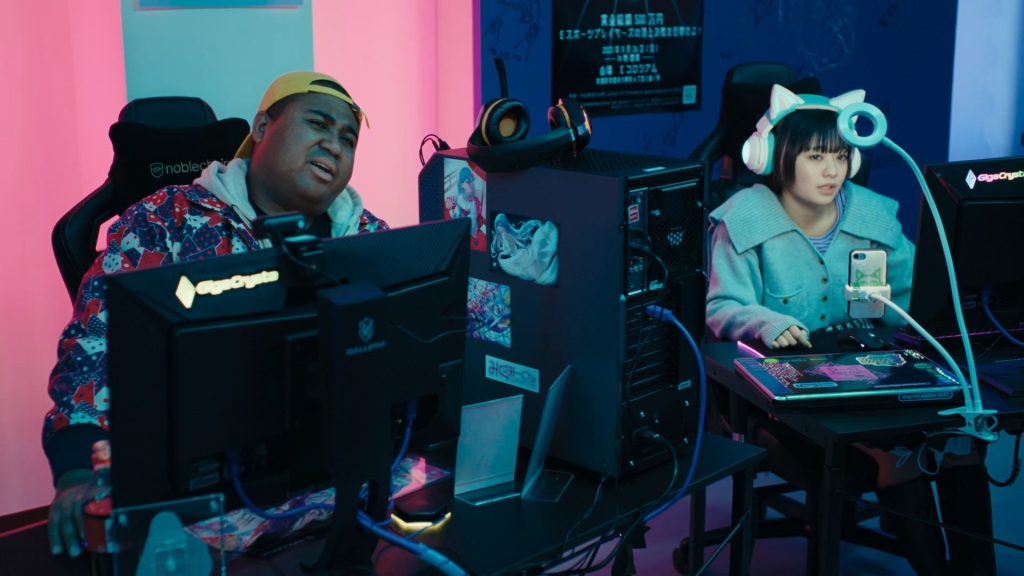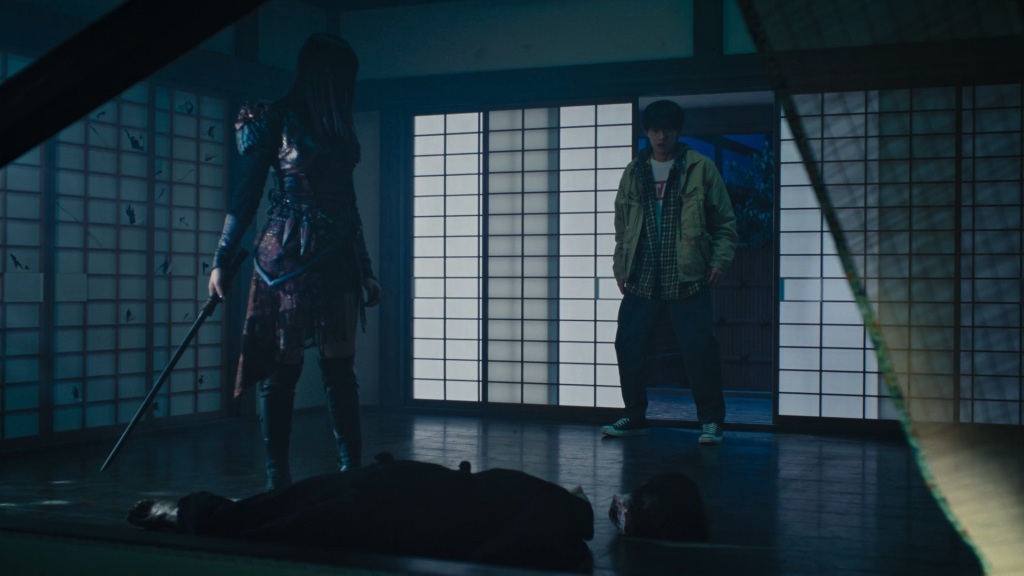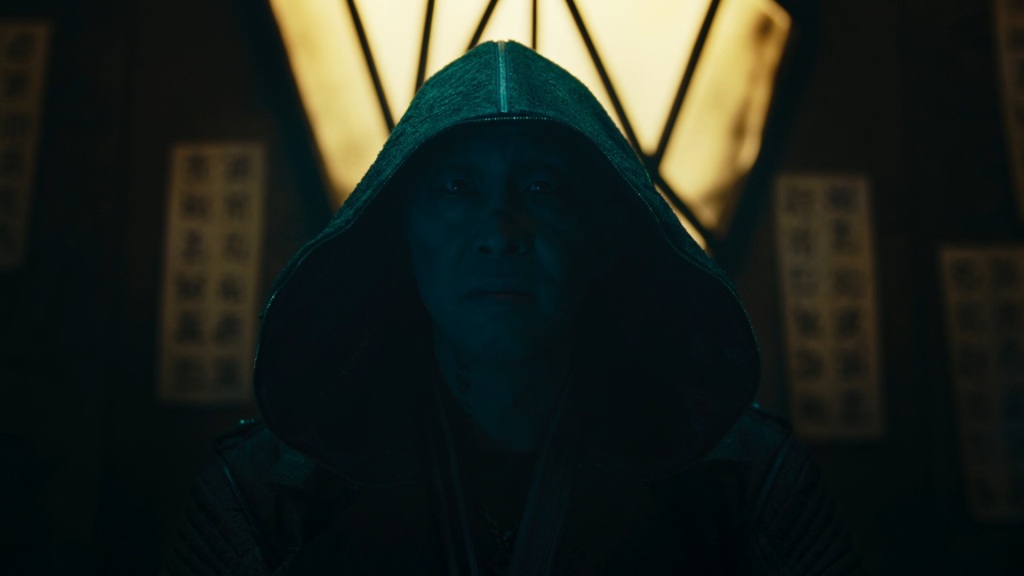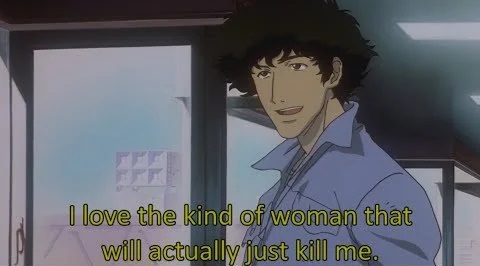
Inside the television event of 2024
As a man with an interesting life, one who pursues many hobbies, it’s only natural I’ve had occasion to add anthropology to the list. Sometimes I simply want to understand people who fascinate and repulse. For example, what kind of sicko watches a show called My Undead Yokai Girlfriend? This, friends, is how I came to watch the Amazon original from March of this year. It was purely academic. I swear.
Our hero is Tadashi Inukai, or “Hachi,” a socially awkward college kid who’s such a loser he even gets clowned on by his pro gamer team, despite that their game of choice is Exoprimal, and how terrifying it is that I recognized it and recalled the title. He’s the kind of guy who turns and sees a pretty girl in the distance waving and waves back, only to realize she was addressing a different guy, giving poor Hachi the “weirdo” glare as she walks away. Ouch! Hitting a little close to home, guys. And while his next move isn’t so relatable – casting a spell to summon a yokai girl – I fear what happens next certainly is.


Princess Izuna-imiki, or “Izzy,” emerges out of a floating portal before Hachi, dressed in a fantasy ninja outfit, and she has a request: “Let’s have intercourse.” Hachi’s first instinct? Run away. She drags him back. “I’m going to have intercourse with you right now,” she says. A crowd is forming. Hachi’s second instinct? Run away.

Recently, Donovan and I did a podcast episode about “dark romance,” a relatively recent phenomenon where the thrill of a typical romance book is upgraded with “darker themes and mature content.” A foundational example is Twilight, which begat 50 Shades of Grey, which begat 365 Days, and these are only the most basic, baby examples. But Twilight is a good starting point because in it, a deadly vampire falls in love with a human he’s driven to kill. Predator and prey.
Generally speaking, the romance genre is something we associate with a female readership, and because the cishet male mainstream is violently resentful of any cultural product not exclusively marketed to them (see: Twilight), it’s something Donovan and I weren’t fully comfortable talking about. As the genre exists in this sort of protective exile, I don’t really want to peek through Themyscira’s barrier from Man’s World to scream, “What about me?” And yet, I’m desperately curious: are there reverse-gender dark romance stories out there?

Pictured: literally me
Let’s say I’m looking “for a supernatural and dark romance with gender roles reversed,” which was a query levied to the Romance Books subreddit in 2022. “I’m looking for a romance similar to Phantom of the Opera, with spooky, even predatory overtones, except I want a spooky and supernatural woman chasing after the innocent and frightened man.” Today, this subreddit has 288,000 members, putting it in the top one percent by size, and this post has fourteen upvotes and two responses, both of them qualified answers. One user says, “Lord of the Last Heartbeat by May Peterson kind of fits,” and the other says “A Cosmology of Monsters sort of fits.” Kind of? Sort of?
Fleeing Izzy, our hapless Hachi runs all the way home and shuts himself up in his room, only for the yokai girl to magically appear next to him. She pushes him down on the bed and starts to undress.


As far as I know, there is no word in the English language that describes the exact feeling of being seen by media, and therefore, no word to describe how I felt watching My Undead Yokai Girlfriend.
And it’s funny, looking back, as I’d dismissed Twilight out of hand but counted among my favorite romantic pairings Shinra and Celty from Durarara!!, Rock and Revy from Black Lagoon, and “third example” from “not found.” Let’s say I’m someone who relates to this guy Hachi. I can make the leap with him to “summon yokai girlfriend” because summoning any girlfriend might as well require arcane magic. What if instead of putting myself out there into a scary world, someone came after me? I’ve since learned that the appeal of dark romance for women is what Natalie Wynn refers to as disavowal, “the process of constructing fantasy situations where your desires are gratified without having to assert or even having to acknowledge the desire.” Understandably, this comes from the patriarchal demand that women be the objects rather than subjects of sex. As a man, I can freely assert/acknowledge my desires, but what I can’t do… is talk to women (which, I should note, is no fault of women). Easier to be prey.

As much as I love them, the thing about Durarara!! and Black Lagoon is that they’re not romance stories. Shinra and Celty aren’t even the main characters. With My Undead Yokai Girlfriend, it’s as if someone plucked those characters out of the larger action story and said, “Let’s just look at this. This, too, is interesting,” and for that, I’m grateful. Especially since the show itself is a lot of fun. It’s breezy and silly, and the action is surprisingly good. The only thing to note is the acting, which would’ve fit an anime to a T. The performances are very large, and while that works for Ai Yoshikawa, playing Izzy with a gravitas that clashes with the everyday settings, Takashi Sorimachi’s Hachi is almost distracting, though I can’t deny he makes great faces. And who knows? If my girlfriend just cut off a guy’s head, I’d probably be at eleven, too.
As of this writing, My Undead Yokai Girlfriend is streaming on Amazon Prime

Spoiler Alert!
The anime-style acting is part of the show’s artifice. Hachi and his friend Tanuki are college students, but they appear to be older while simultaneously dressing younger. In fact, Hachi is only a nerd in the Hollywood sense, with flawless, colored hair; I mean, he’s played by a J-pop idol. It would seem to be a design principle, that most of all, My Undead Yokai Girlfriend should follow its eye-catching title and be fun. Would we really want to see a realistic nerd play this part? That would introduce different, disruptive storytelling priorities. Instead, we have a scene where a bunch of zombies are moaning as zombies do, and a priestess shushes the room and they all fall silent. You idiots were doing that on purpose?! That’s comedy straight out of Zeiram.
So, while I stand by my recommendation above the spoiler fold – like, 100%, if this premise sounds interesting, drop everything – I do want to communicate the arc of my experience with the show, which had gotten complicated over its run. In a succinct assessment, I’d say My Undead Yokai Girlfriend is appropriately weird but not particularly ambitious. And I have to say, that’s an unusual assessment.

Here’s a contrasting example from this year: HBO’s The Sympathizer, which is weird and ambitious in equal measure. There’s a way to play its story straight, and the subject matter surely warrants a sober depiction. It’s about the aftermath of the Vietnam War, but unlike most of those ‘70s American movies about the subject, this one takes on the perspective of a North Vietnamese spy who embeds himself in a South Vietnamese family fleeing Saigon to live in San Francisco. It’s a Vietnamese story, an Asian-American story, a spy story. It’s based on a book by Viet Thanh Nguyen, who kept the movie Oldboy in his head when visualizing certain scenes. The HBO miniseries adaptation is co-created by Don McKellar, director of the great, quiet sci-fi drama Last Night, and Park Chan-wook, director of Oldboy. Now that’s, as Robert Downey Jr. might say, “Total providence.”
The Park Chan-wook shtick is black comedy, so when he brings this sensibility to the adaptation, it helps express the inherent absurdity of the hero’s conflicting identities. In short, it helps express the story. So, thinking about this on the proverbial writer’s corkboard, we have a story – “a Viet Cong spy in the South Vietnamese army relocates to the United States after the fall of Saigon to continue his espionage” – and from that, we determine the best possible approach to the telling: RDJ playing multiple roles, garish visual iconography, sardonic narration, nonlinear timeline, etc. As I discovered, My Undead Yokai Girlfriend is a strict genre exercise. We put its story on the corkboard – “my girlfriend is an undead yokai” – and instead, rifle through a list of existing formulas to tell that story.

In this case, we’ve chosen “romantic comedy,” which is just as much a genre as it is a set of plot beats. There’s the first kiss, the breakup, and of course, the meet-cute. The first episode of My Undead Yokai Girlfriend is actually entitled “Meet Creepy-Cute.” This is additionally problematic when the set of plot beats, designed for 90-minute film, is applied to a roughly four-hour television season (eight half-hour episodes). Each of those beats translates to an entire episode. The actual relationship only encompasses so many of the beats, however, meaning that the lead couple exists in conflict rather than love for prolonged, ironically disproportionate periods of time.
So, let’s say that the couple in a romantic comedy movie breaks up, and this is beat number six, as described by Lynsay McCaulley for Well-Storied. In 13 Going on 30, Jennifer Garner’s character Jenna and Mark Ruffalo’s character Matty have their “dark moment” at around the 86-minute mark, and about five minutes later, they get their happy ending and the movie is over. To be fair (not that this is a criticism), the divide between the characters is planted about ten minutes ahead of the actual split. McCaulley writes that the dark moment “allows [the] characters to view themselves apart from the relationship and the breakup. Where are they in their lives? Are they on the path they wish they were on, or do they want to be somewhere else? What can they do to seek out this new, readjusted goal?” This plot beat has a significant story purpose.

But it also makes me sad, and that’s before it’s stretched out beyond five minutes. For a kind of left-field example, it’s why the third Harold & Kumar movie is the weakest, because when we pick up the story, as it is, the titular heroes haven’t spoken in years. It’s the only one where they have to earn the bromance rather than live in it, and at that point, it’s kind of a different movie. Of course, “different” is essential to a sequel, but this would be like if the sequel to Halloween wasn’t Halloween II but Halloween III, which I suppose it eventually was. It’s a question of essence, and of what can be done with that essence. In the case of A Very Harold & Kumar Christmas, “weakest” only means “least funny.”
In the case of My Undead Yokai Girlfriend, Izzy and Hachi’s dark moment comes at the end of episode six, and they only reconcile at the end of episode eight (it isn’t as total a resolution as in 13 Going on 30, assumedly to leave the door open for a future season). That’s one quarter of the entire show where it’s more like “My Undead Yokai Ex-Girlfriend.” It’s not about being less funny here, but rather that Izzy isn’t around to threaten Hachi with things like “Let’s have intercourse.” Matter of fact, Izzy isn’t around much at all, vanishing after an argument about killing. At least, their final argument about killing.


This conflict follows logically from the premise – which suggests a culture clash – that Hachi doesn’t want the deadly Izzy to murder people, but she’s determined to murder people in order to complete her quest (of which sex with Hachi was the first step). Unfortunately, for multiple episodes, the conflict is static, and its ensuing arguments are more of a refrain than an evolving conversation. Again, this wouldn’t be an issue in a 90-minute movie. Here, it’s also following on from the show’s other genre: action.
In a very “Where’s Poochie?”-style complaint, Izzy shares screentime with at least two other subplots: the police investigation into her string of murders and the cabal of villains more directly plotting against her. The twist with the former is that the lead detective on the case is Hachi’s hot dad, and that leaves the villain subplot the show’s least interesting. There’s the boss villain, a businessman, and he answers to a shadow council that Izzy is hunting. The businessman works with Izzy’s nemesis, an undead samurai with a penchant for making zombie henchmen, including a former classmate of Hachi’s. This zombie acting is more classical, let’s say, using the Frankenstein’s monster method over the Korean twitching contortionist approach they’ve been perfecting for the past ten years or so. (Seriously, Korea, enough with the zombies. Unless it’s Kingdom season three!).

Now, in a Korean drama, you’ll have the base romance story, like the romcom formula, and then an additional flavor, the plot – well, really, the setting. Love is for Suckers! was “romance plus reality TV show,” and so on, but usually, the romance takes priority. I’d say that My Undead Yokai Girlfriend becomes increasingly interested in the heroine vs. villains plot, which is crushing. It might be that Korean dramas are almost universally written by women, and this show was created by two American men (whoa!), but I’m not looking for someone to blame. There’s only myself. As Shikishima said, “It’s my fault, for thinking I could dream again.”
Ultimately, this means that My Undead Yokai Girlfriend is short on the little moments that are actually the bread and butter of a K-drama. Hachi and Izzy have their cute, stumbling first date, and then a romantic moment by a lake (in addition to a sex scene at the end of the first episode), but then it’s zombie time again. There’s lore to uncover and a conspiracy to investigate, and while these can be entertaining, they’re far less special. They’re certainly less weird. And suddenly, we’re back to the scarceness of Shinra and Celty’s relationship.

There’s a lot of fun to be had here. I love how onlookers react to the supernatural stuff, which is: not at all. That’s funny every time. In the second episode, fearful Tanuki convinces Hachi to perform a banishing ritual, which happens to coincide with Izzy’s planned wedding ritual. She performs a modern TikTok-style dance for Hachi’s benefit (he reacts with confusion) and then Tanuki pops up from a hiding spot and casts a spell. Nothing happens, leaving Hachi and Tanuki looking foolish. Tanuki wonders if it’s because he used a rotisserie chicken in the ritual as a substitute for a live one. And then the music darkens, and I think to myself, “Ooh, she’s gonna be so mad at you guys.” I just thought the whole show was gonna be like this.

“You betraying me is unforgivable. And you didn’t even like my dance.”

When asked about the appeal of My Undead Yokai Girlfriend for Western audiences, the Japanese director Takahiro Miki told Tokyo Weekender that it “mixes aspects of modern pop culture, such as e-sports, human beatbox, as well as anime and manga-inspired characters. There’s also the traditional beauty of swordplay and locations in Kyoto that Japanese action teams are well-known for. We believe we’ve created a drama filled with ancient and modern Japanese charm that will excite people overseas.” This quote is the perfect summary, because I agree with these points – it’s a successful multi-hyphenate comedy-horror-action with true-blue screenwriting discipline and handsome production values – but he doesn’t actually mention the premise of the show. I thought you knew me, man. I thought you knew who I was.